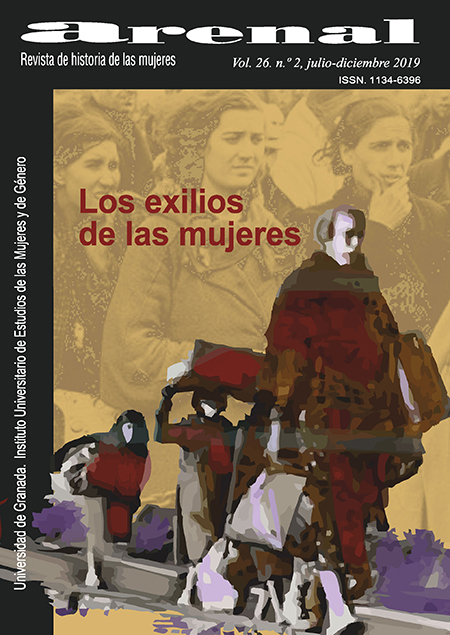Mujeres de refugiados, mujeres refugiadas en la Francia del siglo XIX (años 1830-1870)
DOI:
https://doi.org/10.30827/arenal.v26i2.9237Palabras clave:
Francia, siglo XIX, refugiados, exilio, mujeres, género, violencias conyugalesResumen
El artículo se interroga sobre el lugar ocupado por unas mujeres extranjeras consideradas como “étrangers réfugiés” por la administración francesa desde la Monarquía de Julio hasta el final del Segundo Imperio. Después de las Tres Gloriosas, una serie de emigraciones políticas europeas contribuyó a ampliar los rangos de los extranjeros tratados en Francia como unos “refugiados”: liberales italianos, españoles y portugueses, polacos de la “Gran Emigración”, pero también carlistas españoles que atravesaron la frontera durante la primera guerra carlista.
Nuestro estudio analiza la manera con la que la administración francesa privilegió el reconocimiento del título de “refugiado” a los padres de familia, descartando a las mujeres que eran sin embargo numerosas, tanto extranjeras como francesas. Las mujeres aisladas, solteras o viudas en exilio representaban un grupo aparte que recibía peculiar atención. ¿Cómo, en ausencia de hombres adultos en su entorno, consiguieron ser designadas y reconocidas como unas refugiadas? ¿En qué medida la administración francesa desarrolló la idea de vulnerabilidad para ellas? Mostraremos el papel que aquellas mujeres pudieron desempeñar en las relaciones con la administración francesa y con la sociedad local.
Descargas
Descargas
Archivos adicionales
Publicado
Cómo citar
Número
Sección
Licencia
Los/as autores/as que publican en esta revista están de acuerdo con los siguientes términos:
Los autores/as conservarán sus derechos de autor y garantizarán a la revista el derecho de primera publicación de su obra, el cuál estará simultáneamente sujeto a la Licencia de reconocimiento de Creative Commons 4.0 BY-NC-ND que permite a terceros compartir la obra siempre que se indique su autor y su primera publicación esta revista.
Los autores/as podrán adoptar otros acuerdos de licencia no exclusiva de distribución de la versión de la obra publicada (p. ej.: depositarla en un archivo telemático institucional o publicarla en un volumen monográfico) siempre que se indique la publicación inicial en esta revista.
Se permite y recomienda a los autores/as difundir su obra a través de Internet (p. ej.: en archivos telemáticos institucionales o en su página web) antes y durante el proceso de envío, lo cual puede producir intercambios interesantes y aumentar las citas de la obra publicada. (Véase El efecto del acceso abierto).


















